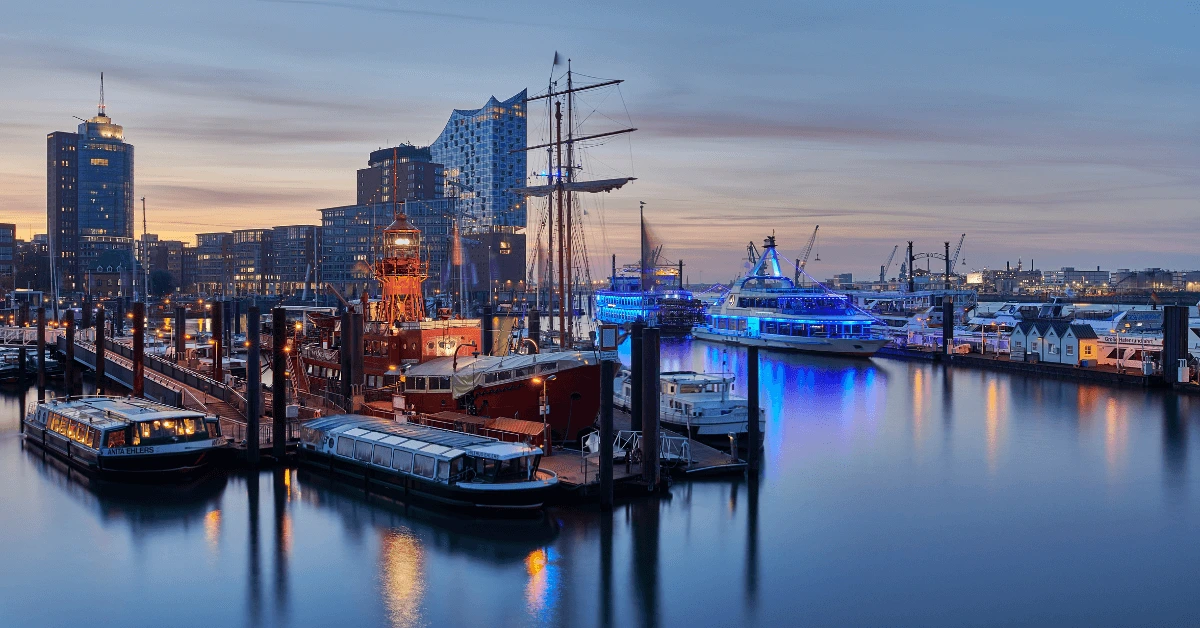Choosing between Hamburg and Berlin for your next German adventure? You’re not alone. These two cities represent the heart of Germany’s cultural landscape, each with its own distinct flavor. From the maritime elegance of Hamburg to the dynamic, history-rich streets of Berlin, this guide dives into what makes each city unique. Whether you prefer the serene ambiance of a port city or the pulsating rhythm of a metropolis that never sleeps, understanding the differences between Hamburg vs. Berlin will help you decide which city aligns best with your travel desires.
Historical Overview
When we delve into “Hamburg vs. Berlin,” we explore two cities with rich, impactful histories. Hamburg, known for its vital maritime trade, has long been Germany’s gateway to the world. Its port, the third-largest in Europe, symbolized the city’s prosperity. In contrast, Berlin’s story as a pivotal political epicenter is unmatched. This city has witnessed the rise and fall of empires, making it a historic hub of power dynamics.
Berlin’s timeline is marked by significant events like the construction and the eventual fall of the Berlin Wall, symbolizing political ideologies that once divided not just a city but the world. The iconic Brandenburg Gate has seen the tumult of history pass beneath its arches, surviving the devastation of World War II and becoming a unifying symbol in its aftermath.
In Hamburg, World War II also left a deep mark, with massive bombings reshaping the city’s fabric. Yet, both cities have shown remarkable resilience, rebuilding and transforming into vibrant, metropolitan beacons.
The presence of the Holocaust Memorial in Berlin is a solemn reminder of the darker chapters of history, just as the Reichstag building stands as a testimony to democratic endurance. As for the Euro, both cities transitioned from the Deutsche Mark, solidifying their roles in the European economy.
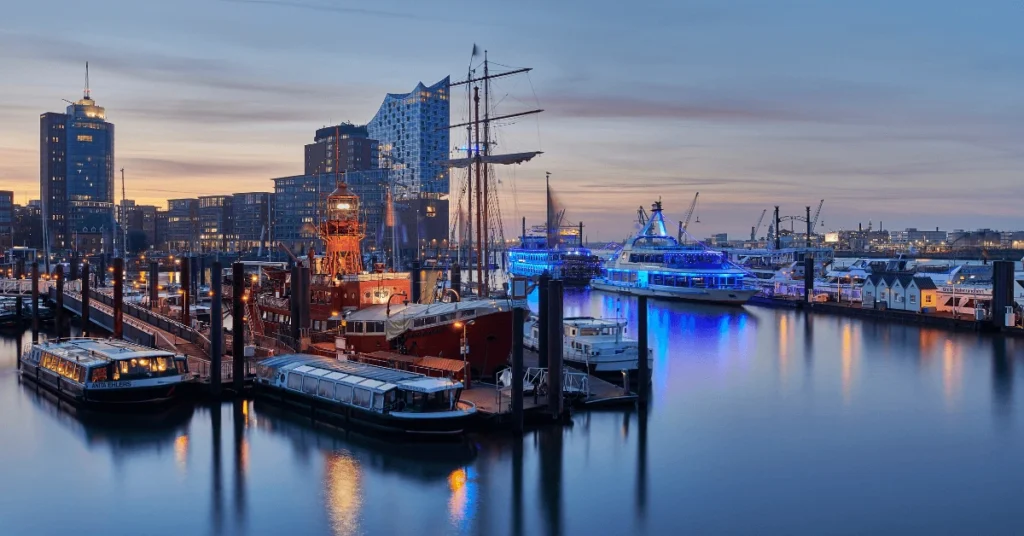
Cultural Insights
Art and Museums
Berlin’s East Side Gallery, a colorful stretch of the Berlin Wall, stands as an iconic open-air gallery showcasing political, social, and artistic commentary. While often associated with its maritime heritage, Hamburg surprises visitors with its array of museums and galleries that celebrate everything from classical fine arts to modern installations.
Music and Nightlife
Music pulses through the veins of both cities. Berlin, a haven for electronic music enthusiasts, is home to the world-renowned Berghain Club and the trendsetting styles of Berlin rave fashion. Meanwhile, Hamburg’s Reeperbahn is a legendary street offering an eclectic mix of live music venues, bars, and clubs, enveloping visitors in its electrifying atmosphere.
Festivals and Events
Throughout the year, festivals and theatrical events fill the calendars of Berlin and Hamburg. Berlin’s Love Parade was a historic event in the techno music scene, while Hamburg celebrates its own unique events, such as the Hamburger Dom fair and the Altonale street festival, each fostering a sense of community and cultural exchange.
Architectural Marvels
Hamburg welcomes us with its harmonious blend of historic and modern structures. The Speicherstadt, the largest warehouse district in the world, presents a gothic revival charm with its red-brick heritage.
Moving to contemporary brilliance, Hamburg proudly showcases the Elbphilharmonie, a concert hall whose shimmering glass waves echo the city’s connection to the Elbe River. This visionary structure combines acoustical finesse with striking aesthetics, making it a beacon of modern architecture.
Berlin, on the other hand, is steeped in history and transformation. Museum Island, a unique ensemble of iconic museums, offers architectural diversity from classic to neoclassical splendor. Berlin’s Brandenburg Gate symbolizes unity and grandeur, an essential relic that survived tumultuous times.
The Reichstag, with its transparent dome, symbolizes Berlin’s transparency and reflects the democratic ethos Germany is proud of. It signifies how architecture can encapsulate history, innovation, and political ideals.
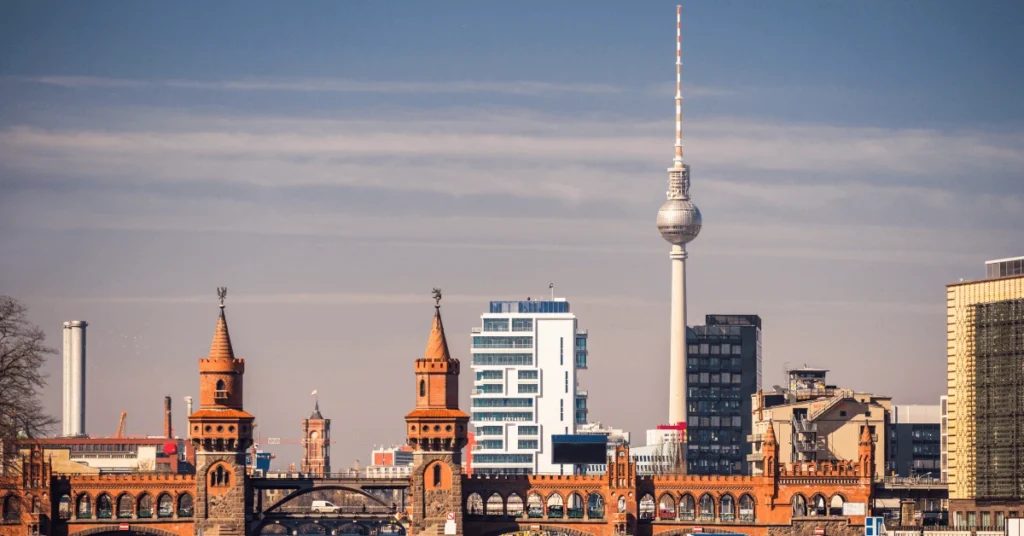
Food and Dining
In Berlin, the iconic dish to try is currywurst, a fast-food staple consisting of steamed, then fried pork sausage cut into slices and seasoned with curry ketchup, usually served with fries. Here’s a simple breakdown of what Berlin offers:
- Street Food: Known for currywurst and döner kebabs.
- Bars: Craft beer scenes with modern and rustic haunts.
- Fine Dining: A mix of traditional and cutting-edge gourmet experiences.
On the other hand, Hamburg takes pride in its maritime heritage, which is reflected in its love for seafood. Fresh fish dishes are a must-try at the vibrant Fish Market or in upscale restaurants. Here is what you can expect:
- Seafood: Fresh fish specialties, from herring to exquisite oysters.
- Bars: Nautical-themed bars and historic taverns.
- Fine Dining: High-end dining with a focus on local and seasonal ingredients.
Accommodation and Costs
In Hamburg, expect to pay around 15.00 euros for an inexpensive meal and approximately 80 euros for a mid-range restaurant meal for two. For places to stay, you’ll find a range from budget-friendly hostels to luxurious hotels. Hamburg’s vibrant neighborhoods, like St. Pauli and HafenCity, offer unique accommodation experiences.
On the other hand, Berlin is known for its more affordable living costs. Inexpensive dining averages about 12.50 euros, while a three-course meal for two at a mid-range restaurant may cost about 60 euros. The German capital is teeming with accommodations that suit every budget, from no-frills backpacker hostels to high-end establishments.
| Hamburg | Berlin | |
|---|---|---|
| Hostel Bed | ~20-30 euros | ~10-25 euros |
| Hotel Room | ~70-150 euros | ~60-130 euros |
| Apartment Rental | ~50-120 euros/night | ~45-100 euros/night |
Berlin might have a slight edge if we’re targeting a more budget-friendly stay due to its generally lower accommodation and meal costs. However, both cities have much to offer, and our choice might be whether we prefer Hamburg’s maritime charm or Berlin’s eclectic buzz.
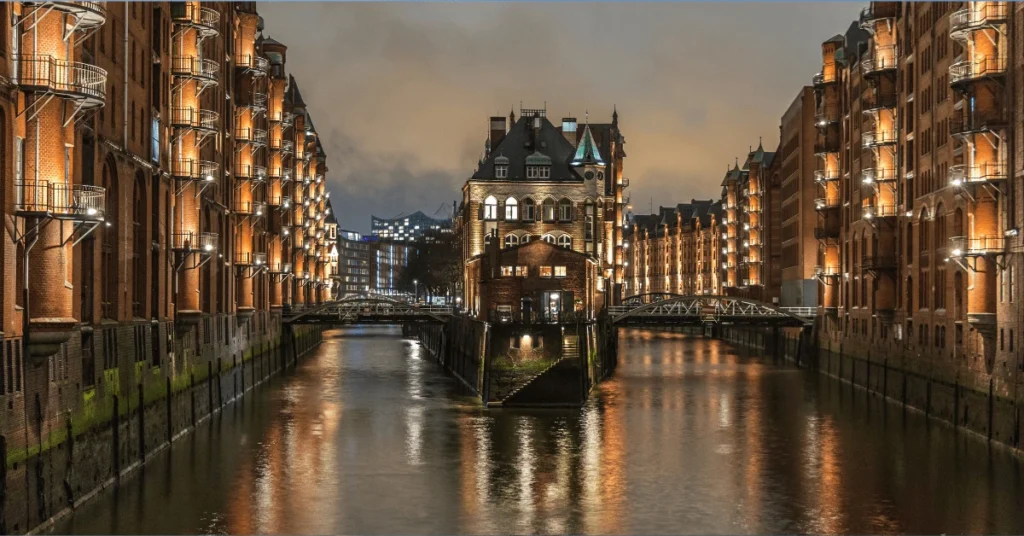
Recreation and Leisure
As we weigh in on “Hamburg vs. Berlin,” let’s touch on how each city lets us kick back and enjoy our free time. In Hamburg, the Port of Hamburg isn’t just a bustling hub of commerce; it’s also a playground for maritime enthusiasts and a picturesque backdrop for leisurely strolls. The city’s connection with water is undeniable, with Alster Lake providing an urban oasis for paddling, sailing, or just unwinding by the shore.
Gardens and parks blossom across both cities. However, Berlin’s sprawling Tiergarten offers a green sanctuary at the city’s heart, perfect for picnics, jogs, or leisurely walks. The eclectic array of Berlin’s nightlife is hard to beat, with venues catering to every conceivable taste. The city thrives after dark, promising unforgettable experiences.
During the summer, Berlin and Hamburg transform with open-air events and festivals. The River Elbe flows through Hamburg, offering breezy beaches and waterside activities that are the epitome of summer fun. Hamburg’s canals meander through quiet neighborhoods, while Berlin’s Spree invites us for a different adventure with its lively riverside bars and clubs.
While both cities boast impressive venues and activities, Hamburg carries an air of nautical charm with its canals and waterways, while Berlin pulsates with an energetic urban vibe that appeals to night owls and park lovers alike. Let’s not forget that each city’s recreational offerings are as unique as our personal preferences.

Practical Information
When we begin to weigh up “Hamburg vs. Berlin,” practical information is crucial for planning our visit. Let’s break it down.
Weather: Hamburg greets us with a maritime climate; it’s cooler and rainier. Berlin, a bit more continental, often offers warmer, drier summers and colder winters. Pack accordingly!
Travel: Public transportation in both cities is stellar. Hamburg’s HVV and Berlin’s BVG include buses, trains, and ferries. A useful travel guide can always help you navigate these systems.
- Berlin: U-Bahn, S-Bahn, trams, and buses.
- Hamburg: S-Bahn, U-Bahn, buses, and ferries.
Language: German is the official language in both. Yet, we’ll find plenty of English speakers, particularly in tourist areas.
Currency: Euro (€) is the currency of choice. ATMs and card payments are widely accepted in both cities.
Keep this information when planning your trip between these two fascinating German cities. Whether you’re leaning towards Hamburg’s port charm or Berlin’s vibrant history and culture, awareness of these details will make our journey smoother.
Our Opinion on Hamburg vs. Berlin
When choosing between Hamburg and Berlin, we often find ourselves in a tug-of-war of attractions, vibes, and experiences. Each city boasts its own unique flair, making the decision anything but straightforward. So, let’s dive right in and compare these two fascinating German cities.
Hamburg is undeniably picturesque, with its beautiful photo spots and stunning architecture around the warehouse district. It feels more laid-back and might appeal to those seeking a quiet charm. The city’s maritime spirit is ever-present, giving it a raw, unfiltered traveling experience that can be especially appealing if you’re short on time but still want to soak in authentic German culture.
Berlin, on the other hand, is a hub for history, culture, and fine dining. It’s a city where the past and present coexist in an eclectic mix, from the remnants of the Berlin Wall to the avant-garde art scene. There’s a definite buzz here that’s hard to find anywhere else. Berlin’s vibe is something many find captivating, with its cultural richness influencing every street corner and café conversation.
Choosing between Hamburg vs. Berlin depends on what you’re looking for. Are you after the vibrant energy of a city that never sleeps, or is a serene getaway with a dose of maritime history more your speed? For us, both cities have their merits, and the contrast between their atmospheres truly shows the diversity of urban life in Germany.
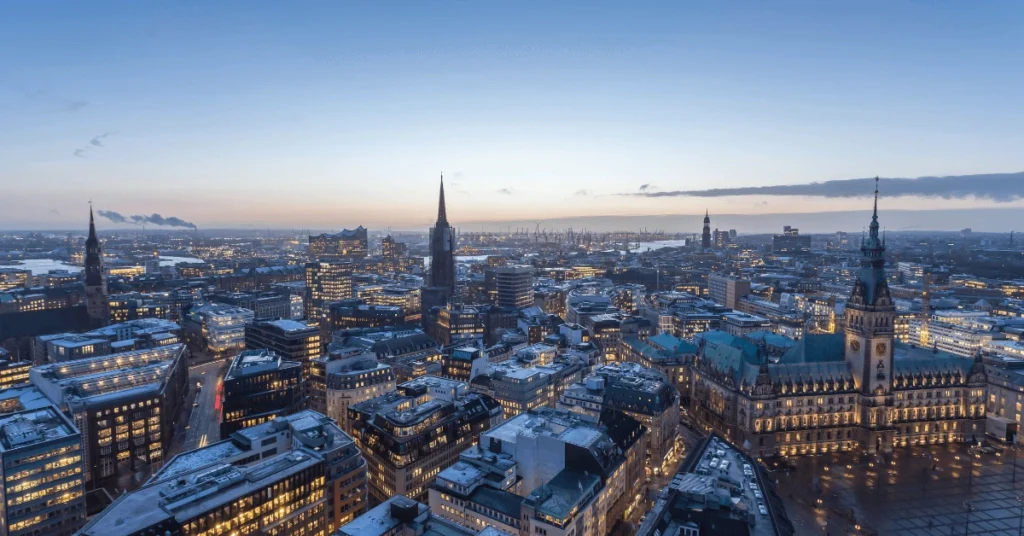
Frequently Asked Questions
Which is better Hamburg or Berlin?
Choosing between Hamburg and Berlin depends on your interests: Hamburg offers maritime charm and green spaces, while Berlin is known for its rich history and vibrant culture.
Is Hamburg bigger than Berlin?
No, Hamburg is not bigger than Berlin. Berlin is both larger in area and has a higher population.
Is it worth going to Hamburg?
Yes, Hamburg is worth visiting for its beautiful harbor, the historic Speicherstadt warehouse district, the vibrant Reeperbahn, and lush parks and waterways.
Why is Hamburg so important?
Hamburg is important because it is a major port city in Germany, playing a crucial role in trade and commerce. Its rich maritime history and cultural offerings make it a key tourist destination.
If you liked this blog post about the topic: Hamburg vs. Berlin, don’t forget to leave us a comment down below to tell us about your experience with it.

